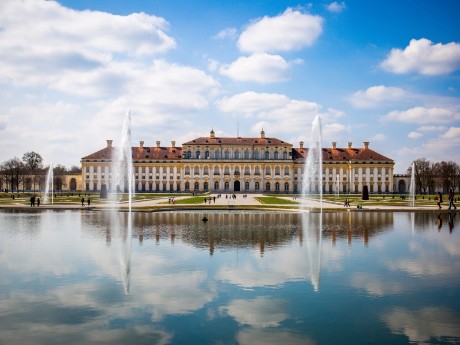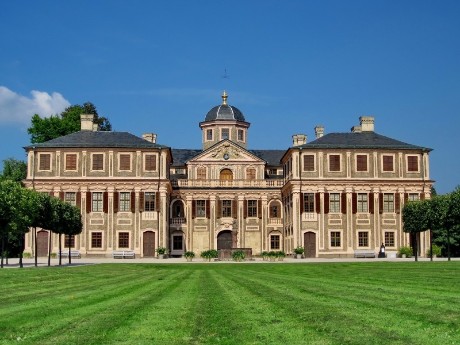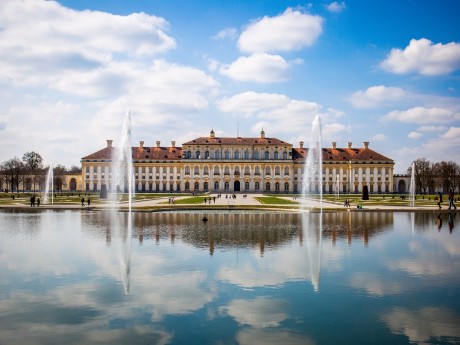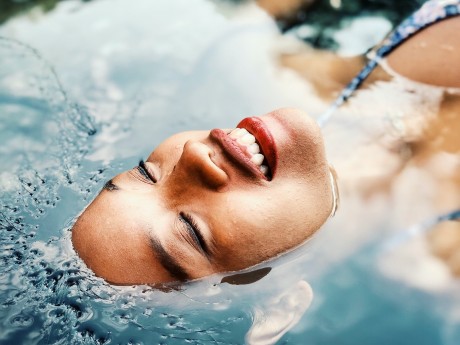Germany Wellness: Munich & Baden-Baden
This trip of wellness and discovery begins in bustling Munich where you will find beautiful architecture exploring stops such as Marienplatz and St. Peter’s Church. In Baden-Baden, unwind at Friedrichsbad or Caracalla Spa to rejuvenate your mind and body at the thermal baths. Those who enjoy the outdoors can spend time at some of Munich’s delightful parks including the English Garden and Olympia Park (the location of the 1972 Olympic Games).
Read more
This trip of wellness and discovery begins in bustling Munich where you will find beautiful architecture exploring stops such as Marienplatz and St. Peter’s Church. In Baden-Baden, unwind at Friedrichsbad or Caracalla Spa to rejuvenate your mind and body at the thermal baths. Those who enjoy the outdoors can spend time at some of Munich’s delightful parks including the English Garden and Olympia Park (the location of the 1972 Olympic Games). Another must stop is the Deutsches Museum, one of the largest science and technology museums in the world! After doing and seeing it all, Baden-Baden is the perfect place to unwind and feel relaxed. This trip is the perfect combination of adventure and wellness. We recommend renting a car to travel at your ease and enjoy views along the way from Munich to Baden Baden. Waterviews strives to offer accommodation options within walking distance of water and/or in an area of touristic interest. Our prices include taxes (but excludes local tourist taxes). Customize your trip to your personal preferences with optional activities (hit the “Add Activities’’) or change hotels, etc. Contact us for customization at no extra cost at: Service@waterviewstravel.com
Destinations
- Munich
- Baden-Baden
- Munich
Itinerary
Munich

Munich is located near the snow-capped Bavarian Alps and boasts beautiful nature all around as well as many green spaces and parks within the city. It is a modern metropolis, home to the world-renowned BMW cars, but also honours its traditions, the most well-known being the Oktoberfest, which is an ode to Munich’s many breweries. Those interested in sampling local dishes should head to the Victuals Market or any of the beer gardens, while for a more sophisticated experience several world-class museums await to be visited.
Read more
Munich is located near the snow-capped Bavarian Alps and boasts beautiful nature all around as well as many green spaces and parks within the city. It is a modern metropolis, home to the world-renowned BMW cars, but also honours its traditions, the most well-known being the Oktoberfest, which is an ode to Munich’s many breweries. Those interested in sampling local dishes should head to the Victuals Market or any of the beer gardens, while for a more sophisticated experience several world-class museums await to be visited.
Additional Information
History
The year 1158 is the earliest date the city is mentioned in a document signed in Augsburg. By that time, Henry the Lion had built a bridge over the river Isar next to a settlement of Benedictine monks. Almost two decades later, in 1175 Munich was officially granted city status and received fortification. In 1180, with the trial of Henry the Lion, Otto I Wittelsbach became Duke of Bavaria and Munich was handed over to the Bishop of Freising. The Wittelsbach dynasty would rule Bavaria until 1918. In 1255, when the Duchy of Bavaria was split in two, Munich became the ducal residence of Upper Bavaria. In the late 15th century, Munich underwent a revival of Gothic arts: the Old Town Hall (Altes Rathaus) was enlarged, and Munich's largest Gothic church, the Frauenkirche cathedral, was constructed in only 20 years, starting in 1468.
When Bavaria was reunited in 1506, Munich became its capital. The arts and politics became increasingly influenced by the court, and Munich became a centre of the German counter-reformation as well as of Renaissance arts. The Catholic League was founded in Munich in 1609. During the Thirty Years' War, Munich became an electoral residence. In 1632, the city was occupied by Swedish King Gustav II Adolph.
After World War I, the city was at the centre of political unrest. In November 1918, on the eve of revolution, the royal family fled the city. After the murder of the first republican premier of Bavaria in February 1919, the Bavarian Soviet Republic was proclaimed, but it was put down on 3 May 1919 by conservative troops. As a result of this turmoil, the first republican constitution enacted for Bavaria was drafted in Bamberg — about as far as you can get from Munich and still be under Bavarian administration. While the republican government had been restored, Munich became a hotbed of extremist politics, among which Adolf Hitler and National Socialism rose to prominence. In 1923 Hitler and his supporters, who were then concentrated in Munich, staged the Beer Hall Putsch, an attempt to overthrow the Weimar Republic and seize power. The revolt failed, resulting in Hitler's arrest and the temporary crippling of the Nazi Party, which was virtually unknown outside Munich at that time.
The city again became a Nazi stronghold when the National Socialists took power in Germany in 1933. The National Socialist Workers Party created the first concentration camp at Dachau, 15 km (10 mi) north-west of the city. Because of its importance to the rise of National Socialism, Munich was referred to as the "Capital of the Movement" ("Hauptstadt der Bewegung"). Munich was also the base of the White Rose (Weiße Rose), a student resistance movement from June 1942 to February 1943. However, the core members — including Hans and Sophie Scholl — were arrested and executed following a distribution of leaflets at the University of Munich. The city was heavily damaged by allied bombing during World War II, with 90% of the historic city centre and 50% overall destroyed.
After the US occupation in 1945, Munich was completely rebuilt. Munich was the site of the 1972 Olympic Summer Games, during which Israeli athletes were assassinated by Palestinian terrorists. The badly botched rescue attempt (Germany did not have anything but regular police to deal with a situation like this) led to the founding of GSG9 one of the best regarded special forces groups which survived its baptism of fire just five years later in the successful freeing of the airplane "Landshut" which had been abducted to Mogadishu by Palestinian terrorists working together with German leftists.
Economy
Munich is the German economic powerhouse, with six out of the 30 companies listed in the German blue-chip stock-market index DAX. These include luxury car maker BMW, electrical engineering giant Siemens, and the world's largest insurance company Allianz.
The Munich region is a centre for aerospace, biotechnology, software and service industries. As the largest publishing city in Europe, Munich is home to Süddeutsche Zeitung, one of Germany's largest and most influential daily newspapers. Germany's largest commercial network, Pro7-Sat1 Media AG is located in Eastern Munich.
Munich's flourishing local economy is reflected in its place in quality-of-life rankings of world cities. Monocle magazine even named it the world's most livable city in 2010. People continue to flock into the city due to its proximity to the Alps and some of the most beautiful scenery in Europe, especially Baroque and Rococo architecture and green countryside which starts a mere half hour away on the S-Bahn. However, there's a price to pay for living here: Munich is the most expensive city in Germany. Real estate development and hotel construction are a regular sight, but so far, demand outstrips supply by far.
Culture
The people of Munich do not like their city to be associated only as a city of beer and the Oktoberfest, and indeed the Bavarian kings transformed Munich into a city of arts and science in the 19th century, and also quite notable architecture. Many of the city's finest buildings belong to this period and were built under the first three Bavarian kings during the first half of the 19th century. Munich's outstanding position among other German cities may have faded a bit, due to Berlin becoming the German capital again in the 1990s, but it is still a vibrant and important city of culture.
The Nationaltheater, where several of Richard Wagner's operas had their premières under the patronage of King Ludwig II, is the home of the world famous Bavarian State Opera and the Bavarian State Orchestra. Next door the modern Residenz Theatre was erected in the building that had housed the Cuvilliés Theatre before World War II. Many operas were staged there, including the premiere of Mozart's "Idomeneo" in 1781. The Gärtnerplatz Theatre is a ballet and musical state theatre, while another opera house, Prinzregententheater has become the home of the Bavarian Theatre Academy. The modern Gasteig Center houses the Munich Philharmonic Orchestra.
Many prominent writers worked in Munich. During the period immediately before World War I, the city became economically and culturally prominent. Munich, and especially its then suburbs of Schwabing and Maxvorstadt, became the domicile of many artists and writers. Nobel laureate Thomas Mann, who also lived there, wrote ironically in his novella Gladius Dei about this period, "Munich shone". It remained a center of cultural life during the Weimar period with figures such as Bertolt Brecht and Lion Feuchtwanger.
Bavaria has been the long-time antipode of Berlin: while the Protestant Prussian kings focused on building military strength, Bavaria's Catholic Wittelsbach kings were more interested in creating a centre of arts and science following the examples of cities in northern Italy. Bavaria takes a position among the German states with a strong emphasis on its independence and has its own conservative party, the Christian Social Union (CSU), which strongly advocates Bavarian interests in Berlin. Unlike Berlin which for historical reasons has been cut off from the surrounding Brandenburg countryside, or Hamburg which prides itself of being a free Hanseatic city, Munich can rely on a local elite willing and eager to shovel state funds its way to the never-ending chagrin of people in other areas administered by Munich such as Franconia. If a royal residence since the early 1800s and subsequently the capital of Germany's most independent minded state looks the part, it is in no small part due to the Munich-centric Bavarian politics and the special role of the CSU since 1949. Among other things, the CSU has 3 ministers in the federal government inaugurated in 2018 while East Germany has none.
Münchner share a lot of characteristics with the rest of Bavaria and it has become popular again among older and younger people to wear traditional Bavarian clothing, at least during the Oktoberfest and similar traditional beer festivals. One notable difference is politics: whereas the rest of Bavaria is a stronghold of conservative Catholicism, Munich has been governed by a liberal coalition of Social Democrats, Greens and the Rosa Liste (a gay rights party). Only 36.2% of its residents are members of the Catholic church while 13.3% are Protestant, 0.3% Jewish and 50.3% are members of another religion or follow no religion.
Language
The official language in Munich is, of course, German. With many Munich residents coming from other German regions or from abroad, "Standard German" dominates as the spoken language in Munich. Nevertheless, some residents speak with a more or less strong Bavarian dialect, which can deviate substantially from the German taught at schools.
Are your German skills limited? Worry not. English is widely spoken and understood throughout the city in restaurants, cafés, tourist attractions and shops. In fact, most of Munich's citizens actually speak really good English, often with levels of fluency that rival those of the Nordic countries. Furthermore, Munich has been the destination of waves of immigrants, particularly from Turkey, the former Yugoslavia, Italy, Greece, the Middle East, and France. However, second or third generation descendants of immigrants do not necessarily speak "the old language" that well or at all.
Climate
Munich has a continental climate, strongly modified by the city's altitude and proximity to the northern edge of the Alps. This means that precipitation is high, and rainstorms can come violently and unexpectedly.
Winters last from December to March. Munich experiences cold winters, but heavy rainfall or snowfall is rarely seen in the winter. The coldest month is January with an average temperature of −2.2°C (28.0°F). Snow cover is seen for at least a couple of weeks during winter. Summers in Munich are warm and pleasant, with an average maximum of 23.8°C (73.8°F) in the hottest months. Summers last from May until September.
An oddity of Munich is the föhn wind, a warm and dry down-slope wind from the Alps, which can raise temperatures sharply within a few hours, even in winter, and increases the range of sight to more than 100 km (60 mi). These winds are sometimes associated with illnesses ranging from migraines to psychosis. The first clinical review of these effects was published by the Austrian physician Anton Czermak in the 19th century. Residents of Munich sometimes use the Föhn as an excuse for having a bad mood, which should not be taken too seriously.
Tourism office
© Sourced from Wikivoyage
Baden-Baden

Baden-Baden is world-renowned for its thermal baths: make sure to visit the Caracalla Therme and the Friedrichsbad. The town itself is full of colourful yet grand architecture and somehow combines the vibe of Germany, France and Greece in one. Even its Casino is set in a Belle Epoque ambiance. The city offers a good mix of relaxation and activity, being located in the Black Forest, with many opportunities for hiking and exploration. But also cultural enthusiasts will get their share, with many concerts, plays and museums available.
Read more
Baden-Baden is world-renowned for its thermal baths: make sure to visit the Caracalla Therme and the Friedrichsbad. The town itself is full of colourful yet grand architecture and somehow combines the vibe of Germany, France and Greece in one. Even its Casino is set in a Belle Epoque ambiance. The city offers a good mix of relaxation and activity, being located in the Black Forest, with many opportunities for hiking and exploration. But also cultural enthusiasts will get their share, with many concerts, plays and museums available.
Munich

Munich is located near the snow-capped Bavarian Alps and boasts beautiful nature all around as well as many green spaces and parks within the city. It is a modern metropolis, home to the world-renowned BMW cars, but also honours its traditions, the most well-known being the Oktoberfest, which is an ode to Munich’s many breweries. Those interested in sampling local dishes should head to the Victuals Market or any of the beer gardens, while for a more sophisticated experience several world-class museums await to be visited.
Read more
Munich is located near the snow-capped Bavarian Alps and boasts beautiful nature all around as well as many green spaces and parks within the city. It is a modern metropolis, home to the world-renowned BMW cars, but also honours its traditions, the most well-known being the Oktoberfest, which is an ode to Munich’s many breweries. Those interested in sampling local dishes should head to the Victuals Market or any of the beer gardens, while for a more sophisticated experience several world-class museums await to be visited.
Additional Information
History
The year 1158 is the earliest date the city is mentioned in a document signed in Augsburg. By that time, Henry the Lion had built a bridge over the river Isar next to a settlement of Benedictine monks. Almost two decades later, in 1175 Munich was officially granted city status and received fortification. In 1180, with the trial of Henry the Lion, Otto I Wittelsbach became Duke of Bavaria and Munich was handed over to the Bishop of Freising. The Wittelsbach dynasty would rule Bavaria until 1918. In 1255, when the Duchy of Bavaria was split in two, Munich became the ducal residence of Upper Bavaria. In the late 15th century, Munich underwent a revival of Gothic arts: the Old Town Hall (Altes Rathaus) was enlarged, and Munich's largest Gothic church, the Frauenkirche cathedral, was constructed in only 20 years, starting in 1468.
When Bavaria was reunited in 1506, Munich became its capital. The arts and politics became increasingly influenced by the court, and Munich became a centre of the German counter-reformation as well as of Renaissance arts. The Catholic League was founded in Munich in 1609. During the Thirty Years' War, Munich became an electoral residence. In 1632, the city was occupied by Swedish King Gustav II Adolph.
After World War I, the city was at the centre of political unrest. In November 1918, on the eve of revolution, the royal family fled the city. After the murder of the first republican premier of Bavaria in February 1919, the Bavarian Soviet Republic was proclaimed, but it was put down on 3 May 1919 by conservative troops. As a result of this turmoil, the first republican constitution enacted for Bavaria was drafted in Bamberg — about as far as you can get from Munich and still be under Bavarian administration. While the republican government had been restored, Munich became a hotbed of extremist politics, among which Adolf Hitler and National Socialism rose to prominence. In 1923 Hitler and his supporters, who were then concentrated in Munich, staged the Beer Hall Putsch, an attempt to overthrow the Weimar Republic and seize power. The revolt failed, resulting in Hitler's arrest and the temporary crippling of the Nazi Party, which was virtually unknown outside Munich at that time.
The city again became a Nazi stronghold when the National Socialists took power in Germany in 1933. The National Socialist Workers Party created the first concentration camp at Dachau, 15 km (10 mi) north-west of the city. Because of its importance to the rise of National Socialism, Munich was referred to as the "Capital of the Movement" ("Hauptstadt der Bewegung"). Munich was also the base of the White Rose (Weiße Rose), a student resistance movement from June 1942 to February 1943. However, the core members — including Hans and Sophie Scholl — were arrested and executed following a distribution of leaflets at the University of Munich. The city was heavily damaged by allied bombing during World War II, with 90% of the historic city centre and 50% overall destroyed.
After the US occupation in 1945, Munich was completely rebuilt. Munich was the site of the 1972 Olympic Summer Games, during which Israeli athletes were assassinated by Palestinian terrorists. The badly botched rescue attempt (Germany did not have anything but regular police to deal with a situation like this) led to the founding of GSG9 one of the best regarded special forces groups which survived its baptism of fire just five years later in the successful freeing of the airplane "Landshut" which had been abducted to Mogadishu by Palestinian terrorists working together with German leftists.
Economy
Munich is the German economic powerhouse, with six out of the 30 companies listed in the German blue-chip stock-market index DAX. These include luxury car maker BMW, electrical engineering giant Siemens, and the world's largest insurance company Allianz.
The Munich region is a centre for aerospace, biotechnology, software and service industries. As the largest publishing city in Europe, Munich is home to Süddeutsche Zeitung, one of Germany's largest and most influential daily newspapers. Germany's largest commercial network, Pro7-Sat1 Media AG is located in Eastern Munich.
Munich's flourishing local economy is reflected in its place in quality-of-life rankings of world cities. Monocle magazine even named it the world's most livable city in 2010. People continue to flock into the city due to its proximity to the Alps and some of the most beautiful scenery in Europe, especially Baroque and Rococo architecture and green countryside which starts a mere half hour away on the S-Bahn. However, there's a price to pay for living here: Munich is the most expensive city in Germany. Real estate development and hotel construction are a regular sight, but so far, demand outstrips supply by far.
Culture
The people of Munich do not like their city to be associated only as a city of beer and the Oktoberfest, and indeed the Bavarian kings transformed Munich into a city of arts and science in the 19th century, and also quite notable architecture. Many of the city's finest buildings belong to this period and were built under the first three Bavarian kings during the first half of the 19th century. Munich's outstanding position among other German cities may have faded a bit, due to Berlin becoming the German capital again in the 1990s, but it is still a vibrant and important city of culture.
The Nationaltheater, where several of Richard Wagner's operas had their premières under the patronage of King Ludwig II, is the home of the world famous Bavarian State Opera and the Bavarian State Orchestra. Next door the modern Residenz Theatre was erected in the building that had housed the Cuvilliés Theatre before World War II. Many operas were staged there, including the premiere of Mozart's "Idomeneo" in 1781. The Gärtnerplatz Theatre is a ballet and musical state theatre, while another opera house, Prinzregententheater has become the home of the Bavarian Theatre Academy. The modern Gasteig Center houses the Munich Philharmonic Orchestra.
Many prominent writers worked in Munich. During the period immediately before World War I, the city became economically and culturally prominent. Munich, and especially its then suburbs of Schwabing and Maxvorstadt, became the domicile of many artists and writers. Nobel laureate Thomas Mann, who also lived there, wrote ironically in his novella Gladius Dei about this period, "Munich shone". It remained a center of cultural life during the Weimar period with figures such as Bertolt Brecht and Lion Feuchtwanger.
Bavaria has been the long-time antipode of Berlin: while the Protestant Prussian kings focused on building military strength, Bavaria's Catholic Wittelsbach kings were more interested in creating a centre of arts and science following the examples of cities in northern Italy. Bavaria takes a position among the German states with a strong emphasis on its independence and has its own conservative party, the Christian Social Union (CSU), which strongly advocates Bavarian interests in Berlin. Unlike Berlin which for historical reasons has been cut off from the surrounding Brandenburg countryside, or Hamburg which prides itself of being a free Hanseatic city, Munich can rely on a local elite willing and eager to shovel state funds its way to the never-ending chagrin of people in other areas administered by Munich such as Franconia. If a royal residence since the early 1800s and subsequently the capital of Germany's most independent minded state looks the part, it is in no small part due to the Munich-centric Bavarian politics and the special role of the CSU since 1949. Among other things, the CSU has 3 ministers in the federal government inaugurated in 2018 while East Germany has none.
Münchner share a lot of characteristics with the rest of Bavaria and it has become popular again among older and younger people to wear traditional Bavarian clothing, at least during the Oktoberfest and similar traditional beer festivals. One notable difference is politics: whereas the rest of Bavaria is a stronghold of conservative Catholicism, Munich has been governed by a liberal coalition of Social Democrats, Greens and the Rosa Liste (a gay rights party). Only 36.2% of its residents are members of the Catholic church while 13.3% are Protestant, 0.3% Jewish and 50.3% are members of another religion or follow no religion.
Language
The official language in Munich is, of course, German. With many Munich residents coming from other German regions or from abroad, "Standard German" dominates as the spoken language in Munich. Nevertheless, some residents speak with a more or less strong Bavarian dialect, which can deviate substantially from the German taught at schools.
Are your German skills limited? Worry not. English is widely spoken and understood throughout the city in restaurants, cafés, tourist attractions and shops. In fact, most of Munich's citizens actually speak really good English, often with levels of fluency that rival those of the Nordic countries. Furthermore, Munich has been the destination of waves of immigrants, particularly from Turkey, the former Yugoslavia, Italy, Greece, the Middle East, and France. However, second or third generation descendants of immigrants do not necessarily speak "the old language" that well or at all.
Climate
Munich has a continental climate, strongly modified by the city's altitude and proximity to the northern edge of the Alps. This means that precipitation is high, and rainstorms can come violently and unexpectedly.
Winters last from December to March. Munich experiences cold winters, but heavy rainfall or snowfall is rarely seen in the winter. The coldest month is January with an average temperature of −2.2°C (28.0°F). Snow cover is seen for at least a couple of weeks during winter. Summers in Munich are warm and pleasant, with an average maximum of 23.8°C (73.8°F) in the hottest months. Summers last from May until September.
An oddity of Munich is the föhn wind, a warm and dry down-slope wind from the Alps, which can raise temperatures sharply within a few hours, even in winter, and increases the range of sight to more than 100 km (60 mi). These winds are sometimes associated with illnesses ranging from migraines to psychosis. The first clinical review of these effects was published by the Austrian physician Anton Czermak in the 19th century. Residents of Munich sometimes use the Föhn as an excuse for having a bad mood, which should not be taken too seriously.
Tourism office
© Sourced from Wikivoyage




